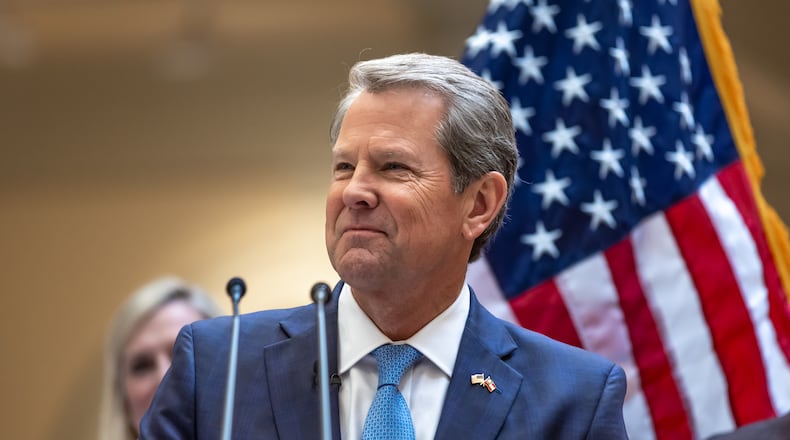FERNANDINA BEACH, Fla. — Gov. Brian Kemp on Thursday delivered an unequivocal message to a room full of the state’s most prominent healthcare executives: Full Medicaid expansion to all poor Georgia adults isn’t happening on his watch in 2025 — and perhaps beyond.
In pointed remarks to the Georgia Hospital Association’s annual meeting in Florida, Kemp summoned up comparisons with liberal California’s healthcare policies and warned of a move toward a “single-payer system” in the United Kingdom.
”To me, that’s not the best path forward. That being said, do we have more work to do? Absolutely, we do,” Kemp said. “And we remain committed toward progress we’ve made in fighting back against efforts that threaten to send us backwards.”
Kemp’s remarks came as preliminary figures suggest that Kemp’s limited Medicaid expansion has fallen well short of its goals in its debut year. The program, called Georgia Pathways to Coverage, on June 30 completed its first 12 months of enrolling poor, uninsured adults on Medicaid. Enrollees must show they have worked 80 hours a month, or attended certain types of school.
Figures as of mid-June released by a nonprofit group that favors expansion, the Georgia Budget and Policy Institute, show that as Pathways neared its first full year, it had enrolled 4,300 people — that’s a fraction of the 90,000 uninsured Georgians that Kemp aides forecasted would be helped.
Credit: Ben Hendren for the AJC
Credit: Ben Hendren for the AJC
At the same time Thursday, Democratic U.S. Senator Raphael Warnock of Georgia was in Washington making the case for state action on Medicaid expansion, and introducing a bill that would use federal powers to bridge the gap in Georgians’ health insurance.
”If I had my way ... we’d pass Medicaid expansion tomorrow,” Warnock told The Atlanta Journal-Constitution. In the meantime, he said, his bill would expand private insurance on the Affordable Care Act marketplace exchange to those who earn below the federal poverty level. Those adults are currently not automatically eligible for Medicaid in Georgia.
Forty states have accepted a federal Medicaid expansion to cover their poor, while Georgia and nine others have held back.
”The governor’s program is not working. People are not covered,” Warnock said, noting the hundreds of thousands of poor adult Georgians without coverage. “We’ve got ... $1.2 billion that I secured to further incentivize states like Georgia to expand; the governor and the Legislature left all that money sitting on the table and the working poor without healthcare coverage.”
“A Georgia-specific way”
Medicaid in Georgia does not cover most poor adults. It covers poor children but only poor adults who fall into certain categories, like being federally declared disabled. Kemp added a category of poor adults who perform certain work or activity requirements.
Kemp, a second-term Republican, has long opposed a full-scale expansion as too costly and inflexible. So his message to the hospital officials Thursday wasn’t surprising to many in the room.
”Do we want to kick 700,000 Georgians off their private-sector health insurance plan and put them on Medicaid?,” he said, referring to people who make just over the federal poverty level and are currently enrolled in nearly free, robust Affordable Care Act private plans under Biden pandemic subsidies. ”Do we want to be like California, which is proposing raising taxes in the middle of an inflation crisis, to cover the cost of swelling Medicaid rolls?”
The governor pleaded for more time for his “Pathways” program to take root, blaming the halting start on a legal battle with Biden’s administration.
Credit: HYOSUB SHIN / AJC
Credit: HYOSUB SHIN / AJC
”We are committed to rolling that program out in a Georgia-specific way to get healthcare to those who need that care and help them pursue greater opportunities,” Kemp said.
Most Georgia officials debating full Medicaid expansion still favor covering all the state’s poor, but not with government-run Medicaid insurance. Instead, they support using the Medicaid money that would come from expansion to pay for private ACA insurance plans for the poor.
But despite a growing number of conservative Republicans who back some sort of Medicaid expansion, along with unified Democratic support behind the initiative, no measure can pass over Kemp’s objection. That’s why all eyes will be on a new state commission, the Comprehensive Health Coverage Commission, instituted by Kemp and legislative leaders to study how to improve healthcare access.
Keep Reading
The Latest
Featured






